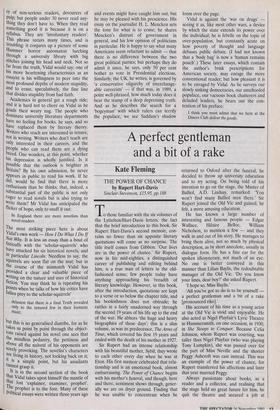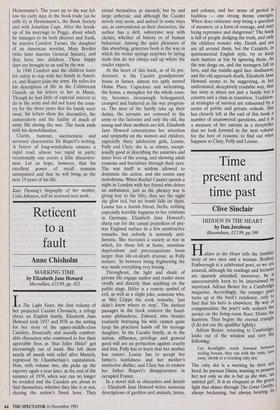A perfect gentleman and a bit of a rake
Kate Fleming
THE POWER OF CHANCE by Rupert Hart-Davis Sinclair-Stevenson, £15.95, pp.188 To those familiar with the six volumes of the Lyttelton/Hart-Davis letters, the fact that the brief introduction to this book, Sir Rupert Hart-Davis's second memoir, con- tains no fewer than six apposite literary quotations will come as no surprise. The title itself comes from Gibbon: 'Our lives are in the power of chance.' Sir Rupert, now in his mid-eighties, a distinguished career of publishing and editing behind him, is a true man of letters in the old- fashioned sense; few people today have anything approaching his breadth of literary knowledge. However, in this book, after the introduction, quotations are kept to a verse or so below the chapter title, and his bookishness does not obtrude; he rattles in a fairly unadorned way through the second 19 years of his life up to the end of the war. He abhors 'the huge and heavy biographies of these days'; this is a slim volume, as was its predecessor, The Arms of Time, which covered his first 19 years and ended with the death of his mother in 1927.
Sir Rupert had an intense relationship with his beautiful mother, Sybil; they wrote to each other every day when he was at Eton. His first memoir celebrated that rela- tionship and is an emotional book, almost embarrassing. The Power of Chance begins with his mother's funeral, and though, here and there, sentiment shows through, gener- ally we are on dryer ground. Finding that he was unable to concentrate when he
returned to Oxford after the funeral, he decided to throw up university education and to try acting. On being told of his intention to go on the stage, the Master of Balliol, A.D. Lindsay, remarked: 'You won't find many Balliol men there.' Sir Rupert joined the Old Vic and gained, he felt, a more amusing education.
He has known a large number of interesting and famous people — Edgar Wallace, Hilaire Belloc, William Nicholson, to mention a few — and they walk in and out of his story. He manages to bring them alive, not so much by physical description, as by short anecdote, usually in dialogue form. He has a fine ear for the spoken idiosyncrasy, not much of an eye. No one is better conveyed in this manner than Lilian Baylis, the redoubtable manager of the Old Vic. 'Do you know your lines, dear boy?' she asked Rupert.
'I hope so, Miss Baylis.'
'All you've *got to do is to be yourself — a perfect gentleman and a bit of a rake [pronounced rike].'
His account of his time as a young actor at the Old Vic is vivid and enjoyable. He also acted at Nigel Playfair's Lyric Theatre in Hammersmith, on one occasion, in 1930, in She Stoops to Conquer. Because Celia Johnson, whom Rupert was courting, was taller than Nigel Piayfair (who was playing Tony Lumpkin), she was passed over for the part of Miss Neville and the shorter Peggy Ashcroft was cast instead. This was an example of the power of chance, for Rupert transferred his affections and later that year married Peggy.
Always passionate about books, as a reader and a collector, and realising that the stage held no great future for him, he quit the theatre and secured a job at Heinemann's. The years up to the war fol- low his early days in the book-trade (as he calls it) at Heinemann's, the Book Society and with Jonathan Cape. After the break- up of his marriage to Peggy, about which he manages to be both discreet and frank, he marries Comfort Turner, the daughter of an American novelist, Mary Borden (who later marries General Spears), and they have two children. These happy days are brought to an end by the war.
In 1940 Comfort and the children leave for safety to stay with her family in Ameri- ca, and Rupert joins the army. He relies for his description of life in the Coldstream Guards on his letters to her in Maine. Though he had little of especial interest to do in the army and did not leave the coun- try for the three years that his family were away, his letters show the discomfort, the camaraderie and the futility of much of army life during the war. The book ends with his demobilisation.
Clarity, humour, succinctness and accuracy characterise Sir Rupert's writing. A horror of long-windedness ensures a rapid read, almost too rapid in parts; occasionally one craves a little discursive- ness. Let us hope, however, that his excellent power of recall remains unimpaired and that he will bring us the next 19 years of his life.
Kate Fleming's biography of her mother, Celia Johnson, will be reviewed next week











































































 Previous page
Previous page